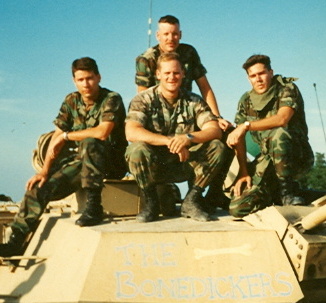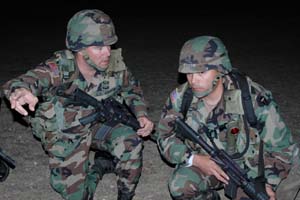I’ve gone through John Kerry’s acceptance speech, sifting out anything related to defense and the war against terror. In analyzing his own words, I’m hoping to gather an idea of how Kerry hopes to lead our military and our country as president and commander-in-chief.
I will be a commander in chief who will never mislead us into war.
….
I will have a secretary of Defense who will listen to the best advice of our military leaders.
….
My fellow Americans, this is the most important election of our lifetime. The stakes are high. We are a nation at war, a global war on terror against an enemy unlike any we have ever known before.
….
And in this journey, I am accompanied by an extraordinary band of brothers led by that American hero, a patriot named Max Cleland. Our band of brothers doesn’t march together because of who we are as veterans, but because of what we learned as soldiers. We fought for this nation because we loved it and we came back with the deep belief that every day is extra. We may be a little older now, we may be a little grayer, but we still know how to fight for our country.
Nothing yet except window dressing, but I included the above portion because it is related. Also, note the backhanded slams on the Bush administration, especially the opening salvo implying that Bush lied about Iraq, which could only serve to undermine our efforts there. Also, regarding the SecDef listening to military leaders, I would suspect that Rumsfeld has listened; he just hasn’t always agreed. The Army wanted the Crusader artillery program kept intact, but Rummy decided it was not needed in the foreseeable future and would provide no advantage in any conflicts currently on the horizon.
Now we get to the heart of Kerry’s defense statements.
Remember the hours after Sept. 11, when we came together as one to answer the attack against our homeland. We drew strength when our firefighters ran up the stairs and risked their lives, so that others might live. When rescuers rushed into smoke and fire at the Pentagon (news – web sites). When the men and women of Flight 93 sacrificed themselves to save our nation’s Capitol. When flags were hanging from front porches all across America, and strangers became friends. It was the worst day we have ever seen, but it brought out the best in all of us.
I am proud that after Sept. 11 all our people rallied to President Bush’s call for unity to meet the danger. There were no Democrats. There were no Republicans. There were only Americans. How we wish it had stayed that way.
Bush laid out his plans for combating terrorism before Congress. The Dems and Reps were generally in agreement then. His strategy and focus has not changed, and he has held true to one course. If we are divided now, it is because others have sought to venture in another direction.
Now I know there are those who criticize me for seeing complexities and I do because some issues just aren’t all that simple. Saying there are weapons of mass destruction in Iraq doesn’t make it so.
Saying there are not weapons of mass destruction, unfortunately, does not make it so, either. How many more must be found?
Saying we can fight a war on the cheap doesn’t make it so. And proclaiming mission accomplished certainly doesn’t make it so.
How about not proclaiming the mission accomplished but instead saying it continues? Enough of the politics, can we get to ideas? As you said, we are a nation at war.
As President, I will ask hard questions and demand hard evidence. I will immediately reform the intelligence system so policy is guided by facts, and facts are never distorted by politics.
Generally agree here. Much needs to be done to repair our intelligence services. However, Kerry helped weaken them and now, with the implication without evidence that the facts were politically manipulated, he politicized the intelligence community needlessly.
And as President, I will bring back this nation’s time-honored tradition: the United States of America never goes to war because we want to, we only go to war because we have to.
How “time-honored” is this tradition? It seems we were itching for 1812, raced into the Spanish-American, could’ve dodged our duty in Korea and Viet Nam, left Grenada alone, and skipped the Balkans.
I know what kids go through when they are carrying an M-16 in a dangerous place and they can’t tell friend from foe. I know what they go through when they’re out on patrol at night and they don’t know what’s coming around the next bend. I know what it’s like to write letters home telling your family that everything’s all right when you’re not sure that’s true.
As President, I will wage this war with the lessons I learned in war. Before you go to battle, you have to be able to look a parent in the eye and truthfully say: “I tried everything possible to avoid sending your son or daughter into harm’s way. But we had no choice. We had to protect the American people, fundamental American values from a threat that was real and imminent.”
So lesson one, this is the only justification for going to war.
A strategy of waiting for danger to become imminent, of letting trouble fester? Wasn’t that what we did in the 1990s, allowing things such a the USS Cole and 9/11 to develop? Isn’t this in conflict with the conclusions of the 9/11 commission?
And on my first day in office, I will send a message to every man and woman in our armed forces: You will never be asked to fight a war without a plan to win the peace.
And it has to be a fool-proof plan, because the party out of power reserves the right to savage the administration over any setbacks or struggles, right?
I know what we have to do in Iraq. We need a president who has the credibility to bring our allies to our side and share the burden, reduce the cost to American taxpayers, and reduce the risk to American soldiers. That’s the right way to get the job done and bring our troops home.
Here is the reality: that won’t happen until we have a president who restores America’s respect and leadership – so we don’t have to go it alone in the world.
And we need to rebuild our alliances, so we can get the terrorists before they get us.
I agree that alliances are useful, and we currently have built a coalition that is in the field in both the Afghan and Iraqi theaters of the war on terror. So it comes down to quibbling about who the members of the coalition are. Maybe a strategy should be in reconsidering the value of some of our old “allies” and examining their motivations.
I defended this country as a young man and I will defend it as President. Let there be no mistake: I will never hesitate to use force when it is required. Any attack will be met with a swift and certain response.
But what about not waiting for an attack? The war has started, it is decidedly to our advantage to choose the battlefield as we see fit.
I will never give any nation or international institution a veto over our national security. And I will build a stronger American military.
We will add 40,000 active duty troops, not in Iraq, but to strengthen American forces that are now overstretched, overextended, and under pressure. We will double our special forces to conduct anti-terrorist operations. We will provide our troops with the newest weapons and technology to save their lives and win the battle. And we will end the backdoor draft of National Guard and reservists.
To all who serve in our armed forces today, I say, help is on the way.
I agree with more troops. As a former Guardsman, I disagree that using the reserve components is a “backdoor draft” (a term, by the way, actually meant to refer to the application of stop-loss on personnel whose military commitment has expired). For the Guard or Reserve called up, it is certainly a hardship and a danger, but it is also a duty and a possibility to be known about from day one of joining the service.
As President, I will fight a smarter, more effective war on terror. We will deploy every tool in our arsenal: our economic as well as our military might; our principles as well as our firepower.
Words. What would Kerry do differently, unless by every tool he is wanting to utilize nukes? We are already operating through military missions, covert ops, economic pressures and inducements.
In these dangerous days there is a right way and a wrong way to be strong. Strength is more than tough words. After decades of experience in national security, I know the reach of our power and I know the power of our ideals.
We need to make America once again a beacon in the world. We need to be looked up to and not just feared.
We need to lead a global effort against nuclear proliferation to keep the most dangerous weapons in the world out of the most dangerous hands in the world.
We need a strong military and we need to lead strong alliances. And then, with confidence and determination, we will be able to tell the terrorists: You will lose and we will win. The future doesn’t belong to fear; it belongs to freedom.
And the front lines of this battle are not just far away they’re right here on our shores, at our airports, and potentially in any town or city. Today, our national security begins with homeland security. The 9/11 Commission has given us a path to follow, endorsed by Democrats, Republicans, and the 9/11 families. As president, I will not evade or equivocate; I will immediately implement the recommendations of that commission. We shouldn’t be letting 95 percent of container ships come into our ports without ever being physically inspected. We shouldn’t be leaving our nuclear and chemical plants without enough protection. And we shouldn’t be opening firehouses in Baghdad and closing them down in the United States of America.
Obviously we need to work on our security, especially if we are going to cease to take the battle to the terrorists.
You don’t value families if you force them to take up a collection to buy body armor for a son or daughter in the service
Political weapon that is apparently unsupported (thanks to Michelle Malkin).
And our energy plan for a stronger America will invest in new technologies and alternative fuels and the cars of the future – so that no young American in uniform will ever be held hostage to our dependence on oil from the Middle East.
I agree that we can look to alternative sources of energy; we can also look to alternative sources of oil, especially when we know there are untapped reserves here in the U.S.
Okay, that’s it, every bit of Kerry’s acceptance speech related to defense, Iraq and his plans for the future of the war against terror. So, what have we learned about the Kerry Doctrine?
- The president must go to war honestly, based only on confirmed facts, and only after all means of avoidance have been exhausted.
- The military should be expanded, both in men and advanced equipment, and the intelligence services should be revamped.
- Old alliances should be restored. How this is to be done when it seems apparent that France and Germany are trying to position themselves as the guiding strengths of the EU and trying to position the EU as a rival to the U.S. is unsaid. Also unstated is the problem of the growing Muslim populations and their militancy in Old Europe, which would hinder the Europeans’ willingness to be full partners with America in the struggle against Islamic fascism. Heck, also unsaid: any reference to the radical Islamist movement.
- Definitely fight if attacked, and have the infrastructure ready to put out the fires and police the wreckage.
- Get our troops out by getting others in the struggle. See above for the complications of guaranteeing the assistance of other nations.
- Try to wean the whole world off the petroleum bottle.
Well, there you have the Kerry Doctrine. Fight when needed, add troops and first responders, improve intelligence, and try to get others to take our place in the war.
Funny, I’m not getting warm fuzzies about our security future.


 I was asked today and have often wondered something about Veterans Day — who is it truly meant to honor? Memorial Day is easy — that is a day to remember and pay homage to those who gave the ultimate sacrifice in the uniform (though everyday we wake up free should be such a day). I knew the origins of today’s holiday, with Nov. 11 (the anniversary of the end of World War I in 1918) formerly being set aside as Armistice Day to honor those who served in that great conflict. In 1954, the name of the holiday was changed to include the veterans of WWII and Korea. Obviously, Veterans Day is a tribute to veterans, but my question was if it was truly meant for combat veterans or those like myself who only served in peacetime?
I was asked today and have often wondered something about Veterans Day — who is it truly meant to honor? Memorial Day is easy — that is a day to remember and pay homage to those who gave the ultimate sacrifice in the uniform (though everyday we wake up free should be such a day). I knew the origins of today’s holiday, with Nov. 11 (the anniversary of the end of World War I in 1918) formerly being set aside as Armistice Day to honor those who served in that great conflict. In 1954, the name of the holiday was changed to include the veterans of WWII and Korea. Obviously, Veterans Day is a tribute to veterans, but my question was if it was truly meant for combat veterans or those like myself who only served in peacetime? I lived in the St. Louis area until 1980 when, at the age of twelve, my family moved to Texas. St. Louis is a baseball-mad city and, as a little league first baseman, my childhood hero was an easy choice — the Cardinals’ all-star and MVP Keith Hernandez. Keith was a very good hitter, but his true strength was in the field. He practically redefined the position, making it no longer the place to park aging sluggers. It was sometimes wondered whether he generated more runs with his bat or saved more with his glove. Though I had moved near Houston, my loyalty remained with Keith and the Redbirds. I went nuts in 1982 when the Cards knocked off the Milwaukee Brewers to take the World Series. Keith had a dinger and eight RBIs in the seven-game series.
I lived in the St. Louis area until 1980 when, at the age of twelve, my family moved to Texas. St. Louis is a baseball-mad city and, as a little league first baseman, my childhood hero was an easy choice — the Cardinals’ all-star and MVP Keith Hernandez. Keith was a very good hitter, but his true strength was in the field. He practically redefined the position, making it no longer the place to park aging sluggers. It was sometimes wondered whether he generated more runs with his bat or saved more with his glove. Though I had moved near Houston, my loyalty remained with Keith and the Redbirds. I went nuts in 1982 when the Cards knocked off the Milwaukee Brewers to take the World Series. Keith had a dinger and eight RBIs in the seven-game series. Every unit patch I wore on the left arm of my BDUs is now officially a memory.
Every unit patch I wore on the left arm of my BDUs is now officially a memory.